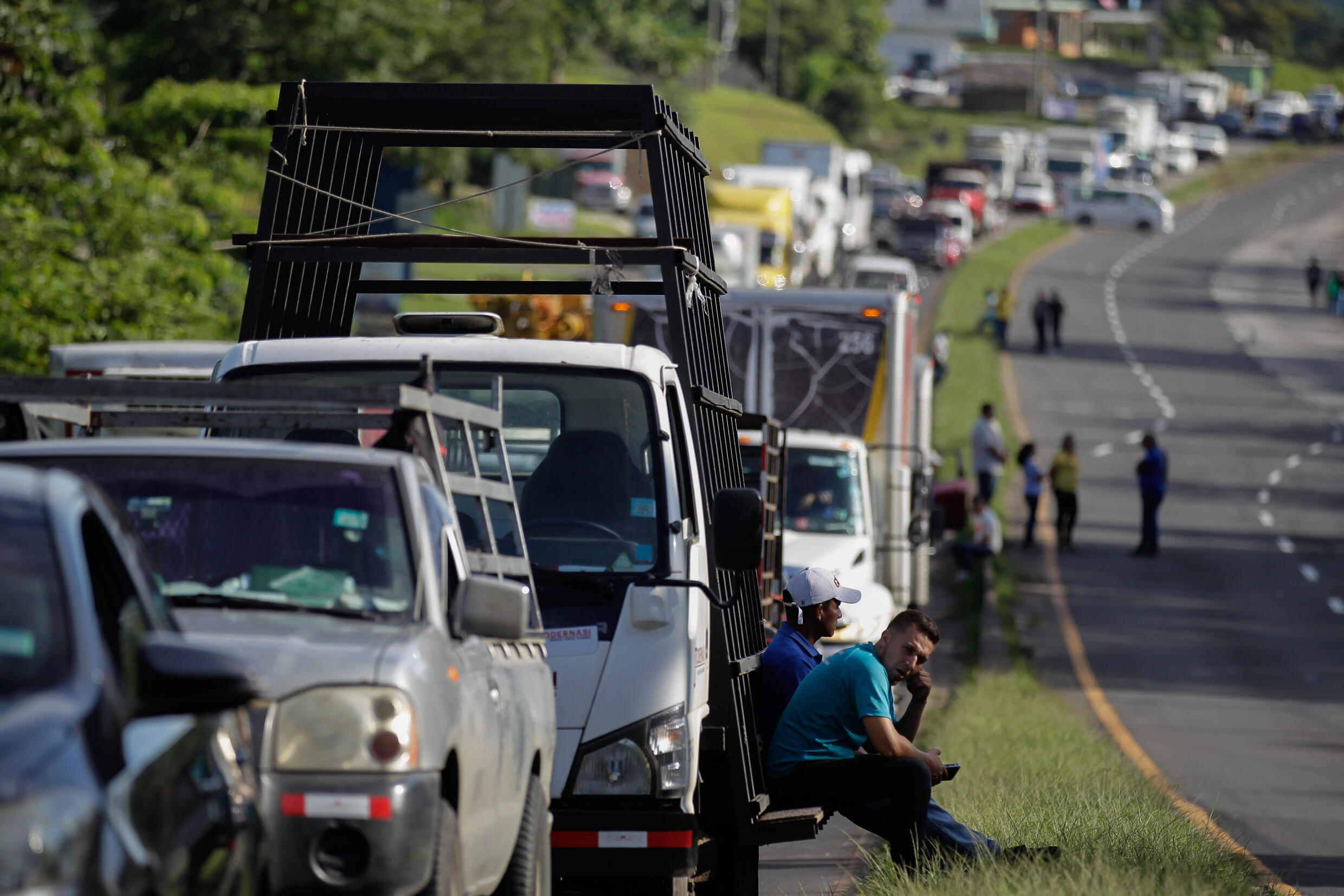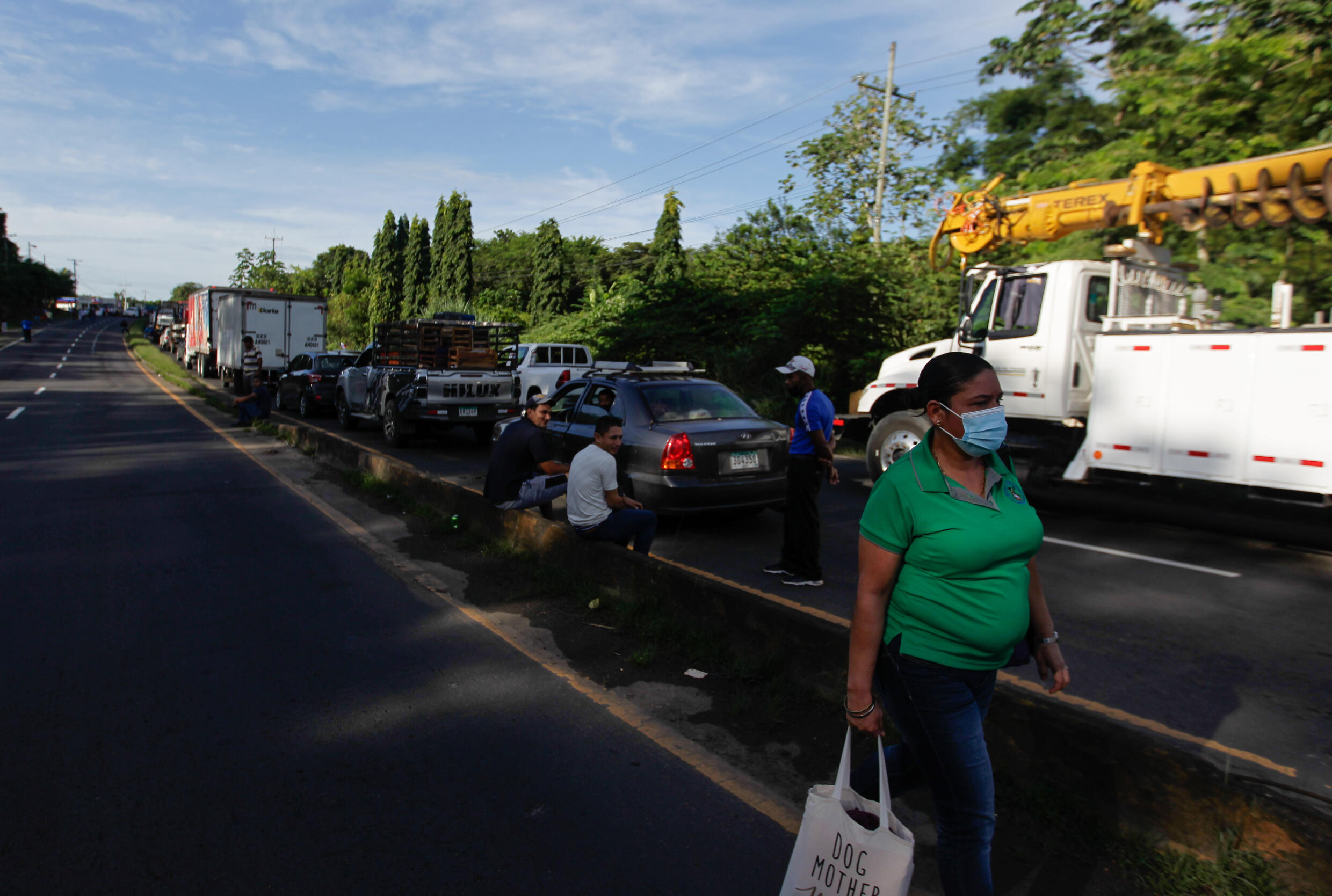Capira (Panama) (AFP) – Katia has been in her car for two hours, along with thousands like her on the Pan-American highway, without being able to pass. But she is not upset. She says that those who demonstrate closing roads in Panama against inflation and corruption also do it for her.
For two weeks, Panamanians have been demonstrating against the rise in the price of fuel, food and medicine, in addition to criticizing their authorities for excessive spending while the population is experiencing difficulties.
“It doesn’t bother me to be here because it’s a way to support (…) How am I going to get angry if those who are closing the road are doing it for a cause of theirs as well as mine, of all Panamanians at the national level?” says Katia Pinzón, a 54-year-old secretary.
In Capira, a town located about 60 kilometers west of Panama City, residents joined the demonstrations and cut off the Inter-American highway, the country’s main connection with Central America and which is part of the Pan-American highway, which unites the entire continent.
Food enters the capital along this route. The main supply center has most of its stalls closed due to lack of merchandise.
“We have received reports from supermarkets that already have a shortage of fresh products and what they tell us is that if the closure continues next week we could even have a shortage of meat,” Marcela Galindo, president of Supermarkets, told the TVN Radio station. the Chamber of Commerce and Industries of Panama.
According to Galindo, the protests are also causing fuel shortages in the interior provinces of the country, which hinders agricultural and livestock production with consequences that could have “an impact even in the medium or long term.”
“We already have people worried because they will not be able to receive the products to maintain their economic activity,” added Galindo.
Thus, Panama is experiencing one of the greatest social crises since the military dictatorship of General Manuel Antonio Noriega fell in 1989 after the US invasion.
Call for dialogue
The Government of Laurentino Cortizo has called for dialogue, while the Catholic Church has offered to mediate to find solutions.

Although there are some isolated clashes, the protests are peaceful, even with music and dance.
An officer who stands guard on a blocked road, and who prefers anonymity, says that this harmony “is not seen much” in the country when there are protests, and that he is surprised by how the neighbors who block coordinate with them.
Every three hours, the tracks open for 10 minutes to lighten the wait. Fire engines and ambulances have a free pass.
The discontent occurs in a scenario of 4.2% year-on-year inflation registered in May and an unemployment rate of around 10%.
The price of fuel has increased 47% since the beginning of the year, currently costing 5.17 dollars per gallon of gasoline (3.78 liters).
But President Cortizo, of social democratic tendency, announced a reduction as of this Friday to 3.95 per gallon and the freezing of the price of some foods. Citizens consider it insufficient.
“This is done by the people”
In this country of more than 4 million inhabitants, around 20% of the population lives in poverty.
Despite its dollarized economy, high rates of economic growth and an interoceanic canal that contributes more than 2,000 million dollars a year to the national treasury, the country has one of the highest rates of inequality in the world and poor public health and education services.
Juan Morales, a 57-year-old agricultural producer, participates in the blockades in Capira. He explains that he left for his own reasons, in coordination with his neighbors.

“We are on a war footing waiting for the government to pronounce itself and give a prompt response on this situation, because we can’t take it anymore,” he says.
He assures that “this protest is being made by the people” because they are “fed up with the government, with so much prebend for white collars. The people, the population itself, are in great need.”
“We cannot be governed by organizations because they are managed by politicians and we do not owe ourselves to that, this is a clearly people’s struggle and not a political one,” he clarifies.
The demonstrations also occur amid criticism of the salaries of authorities, corruption scandals and expenses of parliamentarians, involved in the controversy over a video in which some appear celebrating with a whiskey of about 400 dollars.
“Here the only ones who win are those of the Government. So enough with this, Mr. President ‘Nito’ Cortizo, put your hand on your heart that you said that you were not made of condensed milk,” Morales proclaims.
Cortizo, who still has two years left in office, recently reported that he is facing blood cancer, although it is very low risk.















Add Comment